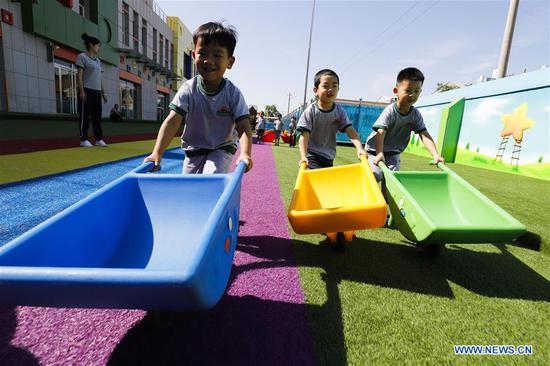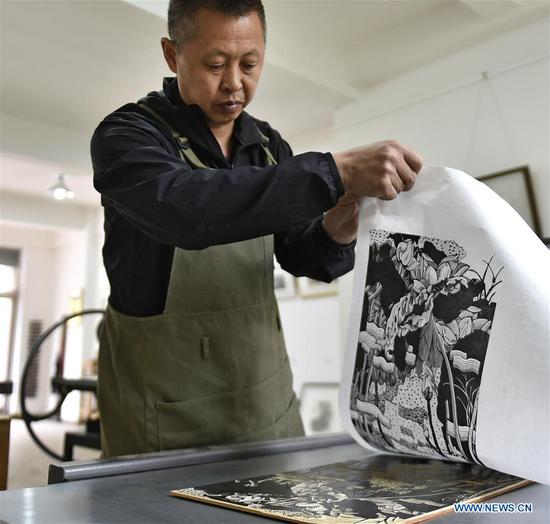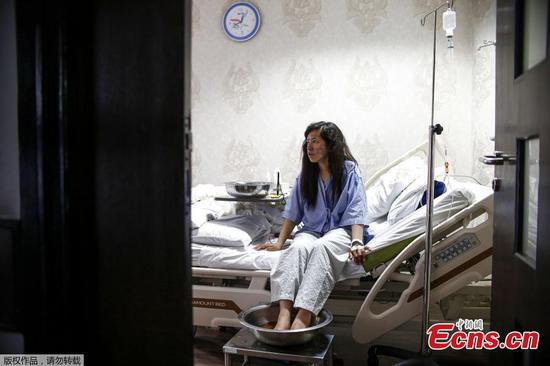China will take more steps to boost community-based elderly care, childcare and household services, including greater policy incentives in taxes and fee cuts, as decided at the State Council's executive meeting chaired by Premier Li Keqiang on Wednesday.
"Elderly care, childcare and housekeeping services are crucial to improving people's wellbeing, addressing the aging of the population and boosting employment. There is huge demand in this regard. The inadequacy of the childcare service, in particular, has become a bottleneck issue with the implementation of the two-child policy," Li said. "Faster development of such services can serve multiple purposes, including boosting consumption, promoting a better division of labor and facilitating economic transformation."
The Wednesday meeting decided on measures to boost community-based elderly care. Efforts will be made to increase the supply of community facilities for such services, and reduce costs. Elderly care facilities installed as required in new residential communities will be offered to the local residents for free or with low-cost. The government will make up for the shortage of such facilities in old residential areas through repurchasing or renting.
Thresholds will be lowered for private actors to provide community-based elderly care services. The government encourages community institutions to develop comprehensive functions including boarding services, day care and home-visit services. The Internet Plus model will be used in offering tailored neighborhood services for senior citizens.
The government will provide greater fiscal support. Training programs for elderly care workers will be supported by government subsidies and other measures.
"We must accelerate the development of community-based elderly care in light of China's realities to boost the services sector. The government needs to provide support in terms of fiscal input, taxation, finance, venues, electricity and water supply," Li said.
Attendees at the meeting adopted an array of measures in promoting higher quality and an expansion of capacity in the household service sector.
Undergraduate colleges and vocational schools will be encouraged to launch majors of household services. Eligible training bases will receive funding support on a priority basis under the central government budget. Household service workers who are flexibly employed will be covered by the professional upskilling subsidies.
Community-based household services companies will not be restricted by the nature of the real estate when renting the service venues. Companies that hire people with difficulty in finding jobs or current-year college graduates will enjoy social insurance subsidies. Commercial banks will be encouraged to explore ways to provide small scale collateral- and guarantee-free loans to household services companies with good credit.
The government will work to improve the standards and credit system, and set up systems for service provider certification and third-party accreditation. All service workers will be required to have rigorous health checks. The government will follow an accommodative and prudential approach in regulating the household services sector.
"We must vigorously develop elderly care and child care," Li said. "Our labor productivity cannot improve without a sound division of labor. The government needs to step up in widening market access and exercising impartial regulation. This will boost the growth of relevant industries and deliver satisfying services to our people." He also stressed the need to scale up vocational training to enhance the reputation and performance of the related industries.
The meeting identified a number of tax incentives for community-based elderly care, childcare and household services.
Between June 1 this year and the end of 2025, earnings of the above-mentioned services will be exempted from value-added tax (VAT), and enjoy a 10 percent deduction in taxable income. Those providing real estate or land for the relevant services will be exempted from deed tax, property tax, urban land use tax and six types of fees including registration fee for real estate.
The scope of VAT exemption for household services companies with contract-based employment will be expanded.


















































